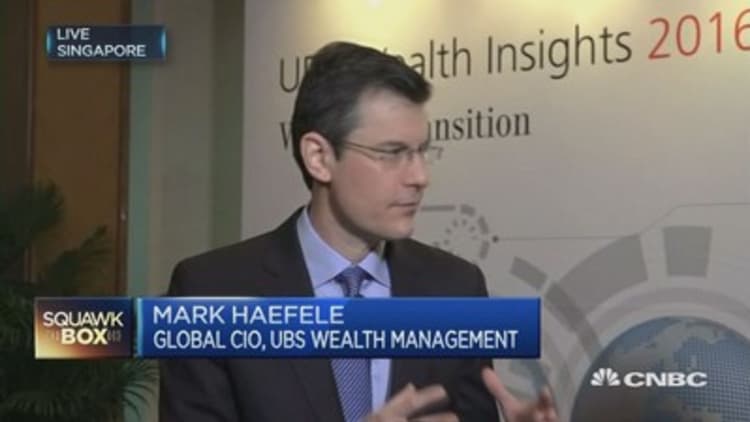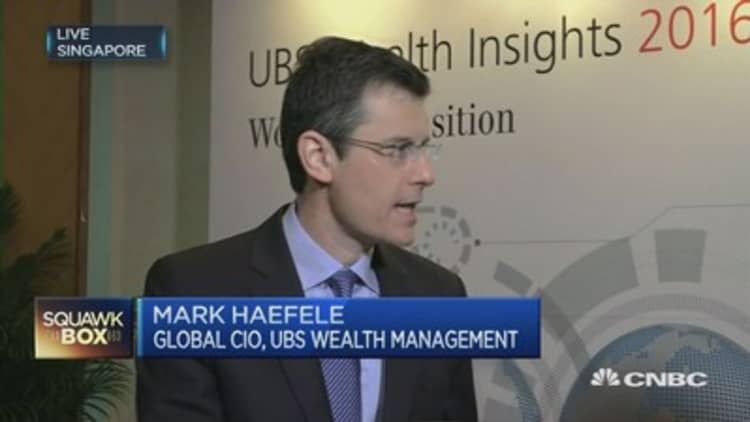


European and Japanese equities are a more attractive option than U.K. and emerging markets stocks, according to the global chief investment officer at UBS Wealth Management.
"We still think that this year equities in the developed markets can be higher by the end of the year," Mark Haefele told CNBC's Squawk Box.
But he noted that market volatility since the start of the year could put that forecast at risk over the next six months.
"We're long Japanese and , where you still have the central bank support and you have the earnings growth," he said.
The European Central Bank (ECB) plans to extend its 60 billion euro-a-month ($64.98 billion) bond-buying program at least through March 2017. That should help to keep euro zone's currency weak, supporting exports, as well as encouraging the purchase of risky assets, such as stocks and corporate bonds.
In its 2016 outlook note, UBS forecast "superior" 8-12 percent earnings growth in Europe over the next 12 months.
That's also driving UBS' preference for European high-yield bonds over U.S. ones.
"You're buying the assets where the central bank is in the markets scooping things up as well," Haefele said.
Meanwhile, Japan's central bank is widely expected to expand its massive quantitative easing program, which increases the country's monetary base by 80 trillion yen ($676.73 billion) a year.
But UBS isn't universally positive on developed markets.
"U.S. equities are kind of the cornerstone still of world equities," Haefele said. "We don't expect there's going to be a lot that does well if U.S. equities have a really bad year. That said, on a valuation basis, the U.S. side is a little expensive and while we think that a lot of this energy repricing is working through, that and the strong dollar can weigh on the U.S. earnings a bit this year."
Energy-related assets have tumbled, marching in time with a plunge in oil prices. West Texas Intermediate (WTI) tumbled as low as $29.93 a barrel in U.S. trade Tuesday, its lowest since December 2003, before settling at $30.44. That's an around 17 percent decline since the start of 2016.
Other commodities have also slumped, and that's spurring another UBS call: "We're going underweight in the U.K. equities and the emerging market equities, which have that commodity exposure," Haefele said.
The U.K. market has a relatively high exposure to the materials and energy sectors, UBS noted in its year-ahead outlook note. The wealth manager expects the market's earnings likely fell 13 percent in 2015, after declining 4 percent in 2014.
China accounts for around 10-15 percent of U.K. stocks' revenues, while emerging markets are responsible for another 35 percent, UBS said.
In emerging markets, earnings growth remains "poor," the UBS note said, noting that profits were down 30 percent from their 2011 peak; it's forecasting 2-6 percent profit growth for the EMs segment.
"Private sector deleveraging will need to continue, Russia and Brazil are likely to remain in recession, and we expect China's growth to slow even more sharply in 2016 than it did in 2015," the note said.
—By CNBC.Com's Leslie Shaffer; Follow her on Twitter @LeslieShaffer1




